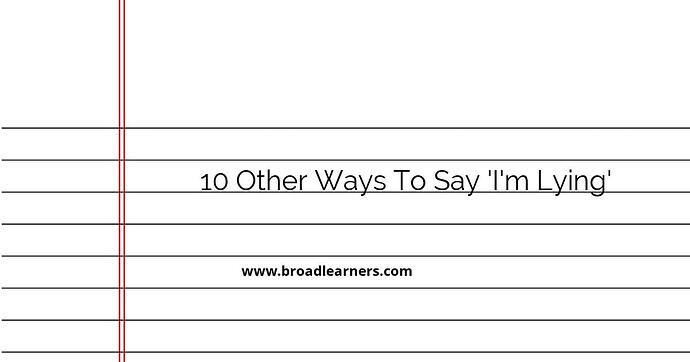Being honest is an important value in any communication, but sometimes we find ourselves in situations where we need to admit that we are not being truthful. While it is always best to tell the truth, there may be times when we want to convey that we are not being honest without explicitly saying 'I'm lying.'
This article presents 10 alternative phrases that can be used to imply that you are not being truthful:
- I may have misspoke
- I may have misunderstood
- I may not be remembering correctly
- I might be mistaken
- I could be wrong
- I might have exaggerated
- I might not have all the facts
- I may be stretching the truth
- I might be bending the truth a little
- I may not be telling the whole story
Now, let's explore each of these alternatives in more detail:
1. I may have misspoke
This phrase suggests that you made an unintentional error in your statement. It implies that you didn't mean to lie, but you may have provided incorrect information accidentally.
Example:
During the meeting, I may have misspoke about the sales figures for last quarter. I apologize for any confusion caused.
2. I may have misunderstood
This phrase indicates that you misinterpreted or didn't fully grasp the information you received. It implies that your lack of comprehension led to an inaccurate statement.
Example:
I may have misunderstood the instructions. Please let me clarify my understanding.
3. I may not be remembering correctly
This phrase suggests that your memory may be faulty and that your recollection of events or details may not be accurate.
Example:
I apologize if I'm not remembering correctly, but I believe we discussed this topic in our last meeting.
4. I might be mistaken
This phrase indicates that you could be wrong or have made an error in your statement. It implies that you are open to the possibility of being incorrect.
Example:
I might be mistaken, but I think the deadline for the project is next week.
5. I could be wrong
This phrase acknowledges that there is a possibility of your statement being incorrect. It conveys a sense of humility and openness to correction.
Example:
I could be wrong, but I believe the report was due yesterday.
6. I might have exaggerated
This phrase suggests that you may have embellished or exaggerated the truth in your statement. It implies that your statement may not be entirely accurate.
Example:
I might have exaggerated a bit when I said it was the best movie I've ever seen.
7. I might not have all the facts
This phrase indicates that you may be lacking some crucial information that could affect the accuracy of your statement.
Example:
I might not have all the facts, but I believe the project budget has been approved.
8. I may be stretching the truth
This phrase implies that you may be bending or distorting the truth in your statement. It suggests that you are not fully truthful.
Example:
I may be stretching the truth a little when I said I finished the report ahead of schedule.
9. I might be bending the truth a little
This phrase suggests that you may be manipulating or altering the truth in your statement. It conveys a sense of deceit or partial honesty.
Example:
I might be bending the truth a little when I said I have experience in that particular software.
10. I may not be telling the whole story
This phrase indicates that you may be omitting or withholding certain information that could affect the accuracy or completeness of your statement.
Example:
I may not be telling the whole story, but I can assure you that I did my best to resolve the issue.
While it is always recommended to be honest and transparent in your communication, these phrases can be used in situations where you need to imply that you are not being truthful without explicitly stating 'I'm lying.' However, it is important to use them sparingly and responsibly, as dishonesty can damage trust and relationships.
Did I miss anything? Respond below
